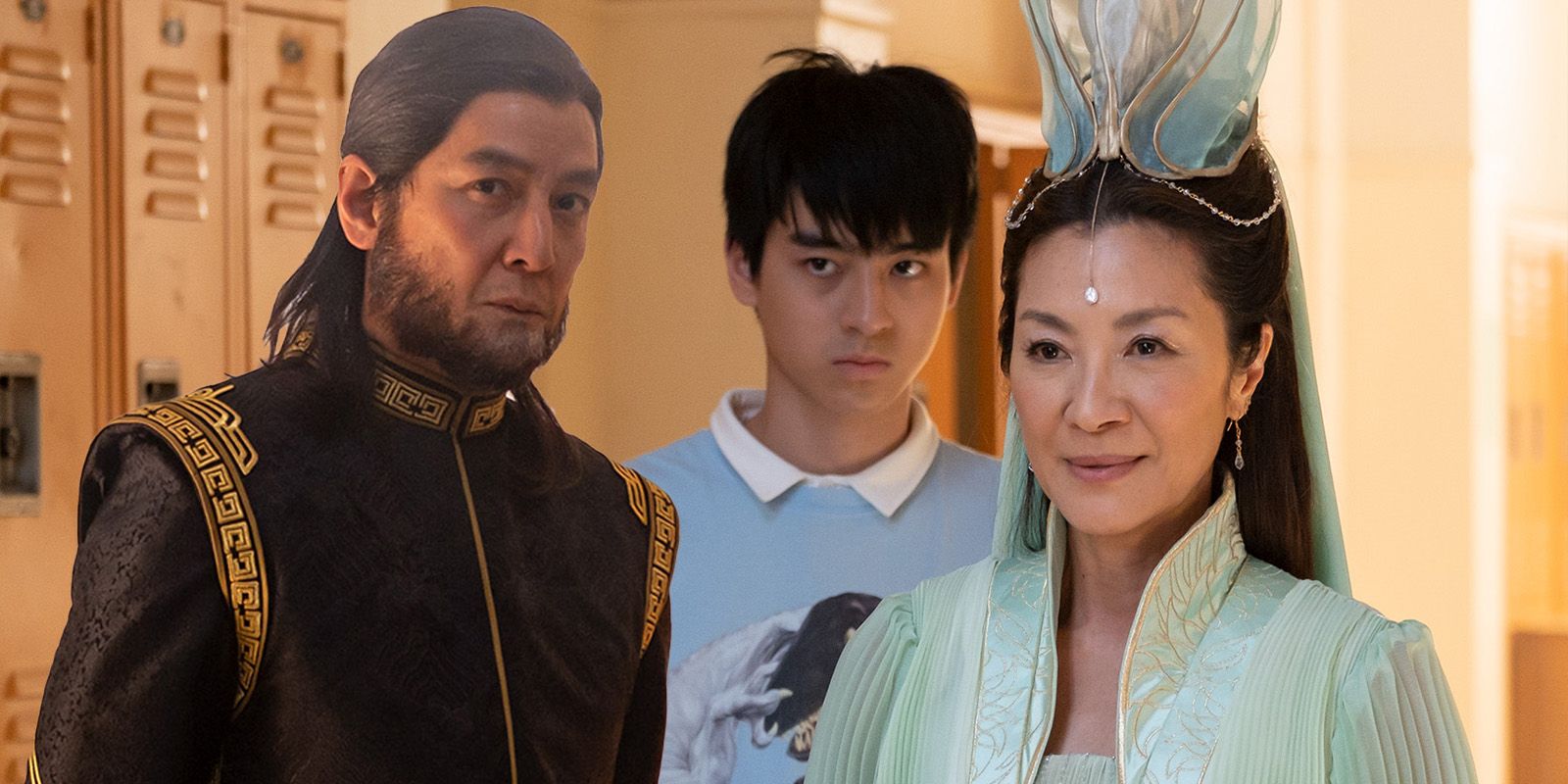American Born Chinese is now streaming on Disney+, and season 1 skillfully takes audiences through young Jin’s (Ben Wang) hero journey while also introducing them to iconic figures from Chinese mythology. Jin’s cautious way of life is thrown into chaos when he meets transfer student Wei-Chen (Jimmy Liu), whose overconfidence stems from his heritage as the son of the Monkey King. The latter, believing that Jin holds the key to saving Heaven, drags his friend into a world of powerful gods and destined missions — but all Jin wants is to ask out new girl Amelia (Sydney Taylor).
Though the series is based on Gene Luen Yang’s graphic novel of the same name, American Born Chinese also borrows many characters and elements from the classic novel Journey to the West. The ensemble cast of gods includes several actors from Everything Everywhere All At Once, including Michelle Yeoh, Stephanie Hsu, and James Hong, while Ke Huy Quan plays a TV character who gets tied into Jin’s narrative and indirectly inspires him to stand up for himself.
Screen Rant spoke to Yang and Mar about how they incorporated more gods from Chinese mythology — specifically Journey to the West — into American Born Chinese season 1 and paid homage to the classic Japanese anime Science Fiction Saiyuki Starzinger in episode 4.
Gene Luen Yang & Melvin Mar Talk American Born Chinese
Screen Rant: I love Michelle Yeoh as Guanyin and her almost Fairy Godmother-esque dynamic with Wei-Chen. Can you guys talk about bringing the gods to the screen? Was that a relationship in your original graphic novel?
Gene Luen Yang: Guanyin wasn’t in American Born Chinese, but she did show up in another graphic novel that I did called Boxers & Saints. But she’s a big part of Journey to the West, which is the novel that was written 500 years ago that tells the story of the Monkey King.
My graphic novel does reference Journey to the West, and when we decided to expand a 200-page graphic novel into a television series, we needed to bring more characters in. Guanyin was a natural choice, because she’s such an important part of that original mythology. But it was a ton of fun to expand that world of Chinese gods.
Speaking of expanding that world, I loved the flashback episode where we actually meet so many of those characters in the prime of their story. Melvin, how early on did you know you were going to do that? And were there any challenges in terms of bringing them to life, either physically speaking or otherwise?
Melvin Mar: We talked about it pretty early on, when we got greenlit to series. Gene and Kelvin can talk about it too, but episode 4 is essentially the very beginning of the graphic novel. We started talking about what that is, and I remember Kelvin saying, “We’ve got to do an episode where it’s like a giant party in Chinese heaven.”
We thought it would just be super fun, and we pushed for, “Well, it’s got to be in Mandarin,” which was a challenge initially to convince everybody. But with the way television is going now, international television has pervaded everything. I remember that early on, we said to the executives, “You know what the biggest shows in Asia are? Korean soaps.” And they’re all in Korean; everything’s just translated. I go, “I don’t think people are afraid of it anymore. People are not afraid of subtitles.” And they agreed, so we got to make it.
I think we were very lucky, in terms of the costume designers and all the production designers. It wasn’t that challenging. I mean, it’s always challenging in production, but they had a very clear vision with Kelvin and [Destin Daniel Cretton]. It’s one of the proudest episodes of television I’ve ever been involved with; putting that episode forth. It’ll be great.
Gene Luen Yang: A lot of American viewers don’t know this, but viewers from all over the world will. Episode 4 is actually this very fun but also a sophisticated homage to a classic television show called Saiyuki Starzinger [also known as Spaceketeers], but in English, it’s usually called Monkey. It was created in Japan, starting in 1978. I think it ran maybe for three or four seasons, and it was exported all over the world. People in Australia, New Zealand, Mexico, or the United Kingdom, have all grown up with this show.
I’m not totally sure why I never came to America. But I’ll be at conventions and, because I have multiple projects now with the Monkey King as a character, I’ll have these people come up to me. They’re usually 80s kids, and they’ll talk about that show. They’ll tell me how much they love that show, so in a lot of ways, episode 4 is a love letter to the fans of that classic Japanese TV show.
About American Born Chinese
Jin Wang starts his sophomore year, hoping to make the soccer team and “level up” his social status, all while impressing his crush. But his plans are derailed when he’s assigned a new student “shadow” from China named Wei-Chen Sun. At home, Jin’s parents Simon and Christine argue over Simon’s job. Meanwhile, Sun Wukong, the Monkey King, searches for his magical Iron Staff, which has been stolen.
Check back soon for our other American Born Chinese interviews with:
American Born Chinese is now streaming on Disney+.
This story originally appeared on Screenrant


